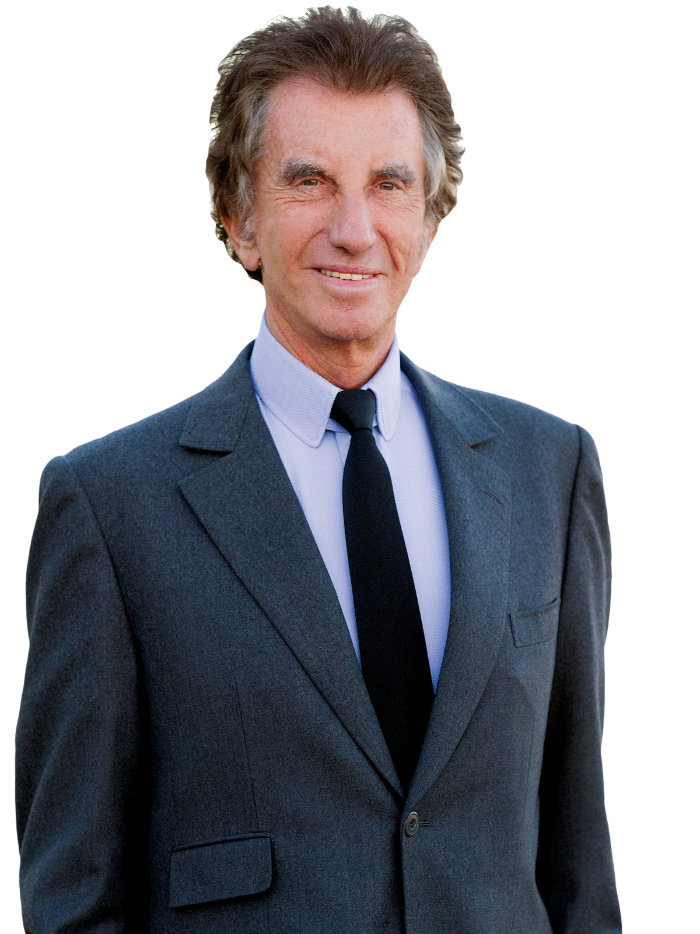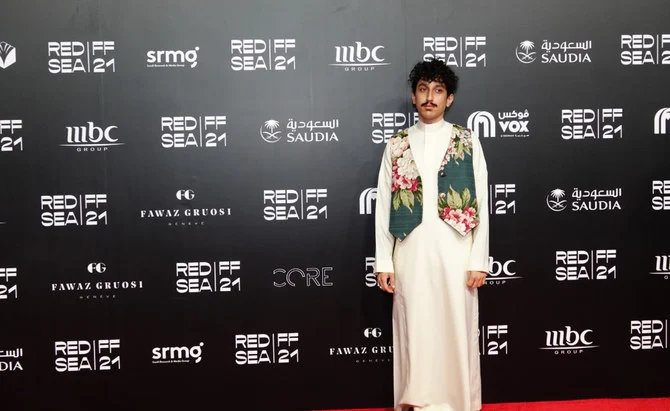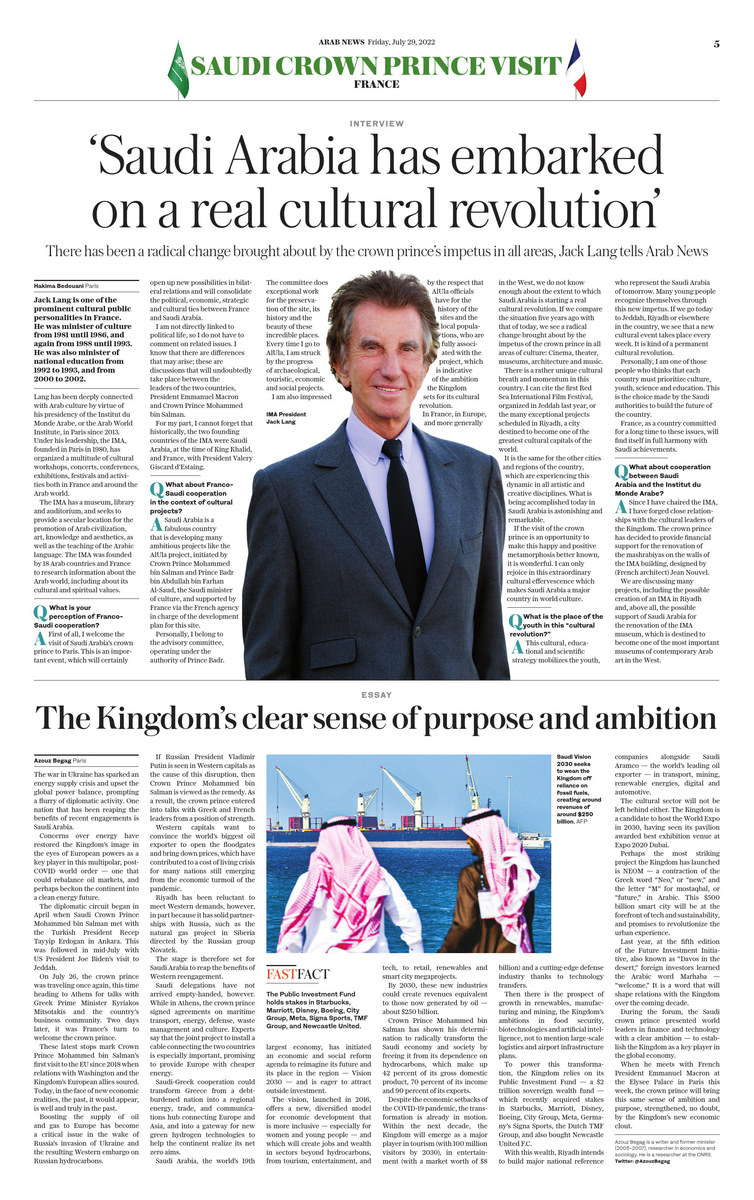PARIS: Jack Lang is one of the prominent cultural public personalities in France. He was minister of culture from 1981 until 1986, and again from 1988 until 1993. He was also minister of national education from 1992 to 1993, and from 2000 to 2002.
Lang has been deeply connected with Arab culture by virtue of his presidency of the Institut du Monde Arabe (IMA), or the Arab World Institute, in Paris since 2013. Under his leadership, the Arab World Institute, founded in Paris in 1980, has organized cultural workshops, concerts, conferences, exhibitions, festivals and activities both in France and around the Arab world.
The IMA has a museum, library and auditorium, and seeks to provide a secular location for the promotion of Arab civilization, art, knowledge and aesthetics as well as the teaching of Arabic. It was founded in 1980 by 18 Arab countries and France to research information about the Arab world, including its cultural and spiritual values.
Q. What is your perception of Franco-Saudi cooperation?
A. First of all, I welcome the visit of Saudi Arabia’s crown prince to Paris. This is an important event, which will certainly open up new possibilities in bilateral relations and will consolidate the political, economic, strategic and cultural ties between France and Saudi Arabia.
I am not directly linked to political life, so I do not have to comment on related issues. I know that there are differences that may arise; these are discussions that will undoubtedly take place between the leaders of the two countries, President Emmanuel Macron and Crown Prince Mohammed bin Salman.
For my part, I cannot forget that historically, the two founding countries of the IMA were Saudi Arabia, at the time of King Khalid, and France, with President Valery Giscard d’Estaing.

France's former culture minister Jack Lang. (Supplied)
Q. What about Franco-Saudi cooperation in the context of cultural projects?
A. Saudi Arabia is a fabulous country that is developing many ambitious projects like the AlUla project, initiated by Crown Prince Mohammed bin Salman and Prince Badr bin Abdullah bin Farhan Al-Saud, the Saudi minister of culture, and supported by France via the French agency in charge of the development plan for this site.
Personally, I belong to the advisory committee, operating under the authority of Prince Badr. The committee does exceptional work for the preservation of the site, its history and the beauty of these incredible places. Every time I go to AlUla, I am struck by the progress of archaeological, touristic, economic and social projects.
I am also impressed by the respect that AlUla officials have for the history of the sites and the local populations, who are fully associated with the project, which is indicative of the ambition the Kingdom sets for its cultural revolution.
In France, in Europe, and more generally in the West, we do not know enough about the extent to which Saudi Arabia is starting a real cultural revolution. If we compare the situation five years ago with that of today, we see a radical change brought about by the impetus of the crown prince in all areas of culture: Cinema, theater, museums, architecture and music.
There is a rather unique cultural breath and momentum in this country. I can cite the first Red Sea International Film Festival, organized in Jeddah last year, or the many exceptional projects scheduled in Riyadh, a city destined to become one of the greatest cultural capitals of the world.
It is the same for the other cities and regions of the country, which are experiencing this dynamic in all artistic and creative disciplines. What is being accomplished today in Saudi Arabia is astonishing and remarkable.
If the visit of the crown prince is an opportunity to make this happy and positive metamorphosis better known, it is wonderful. I can only rejoice in this extraordinary cultural effervescence which makes Saudi Arabia a major country in world culture.

Cinematic masterpieces and their creators flocked to Jeddah for the long-awaited Red Sea International Film Festival late last year. (AN photo)
Q. What is the place of youth in this “cultural revolution?”
A. This cultural, educational and scientific strategy mobilizes the youth, who represent the Saudi Arabia of tomorrow. Many young people recognize themselves through this new impetus. If we go today to Jeddah, Riyadh or elsewhere in the country, we see that a new cultural event takes place every week. It is kind of a permanent cultural revolution.
Personally, I am one of those people who thinks that each country must prioritize culture, youth, science and education. This is the choice made by the Saudi authorities to build the future of the country.
France, as a country committed for a long time to these issues, will find itself in full harmony with Saudi achievements.
Q. What about cooperation between Saudi Arabia and the IMA?
A. Since I have chaired the IMA, I have forged close relationships with the cultural leaders of the Kingdom. The crown prince has decided to provide financial support for the renovation of the mashrabiyas on the walls of the IMA building, designed by (French architect) Jean Nouvel.
We are discussing many projects, including the possible creation of an IMA in Riyadh and, above all, the possible support of Saudi Arabia for the renovation of the IMA museum, which is destined to become one of the most important museums of contemporary Arab art in the West.

















